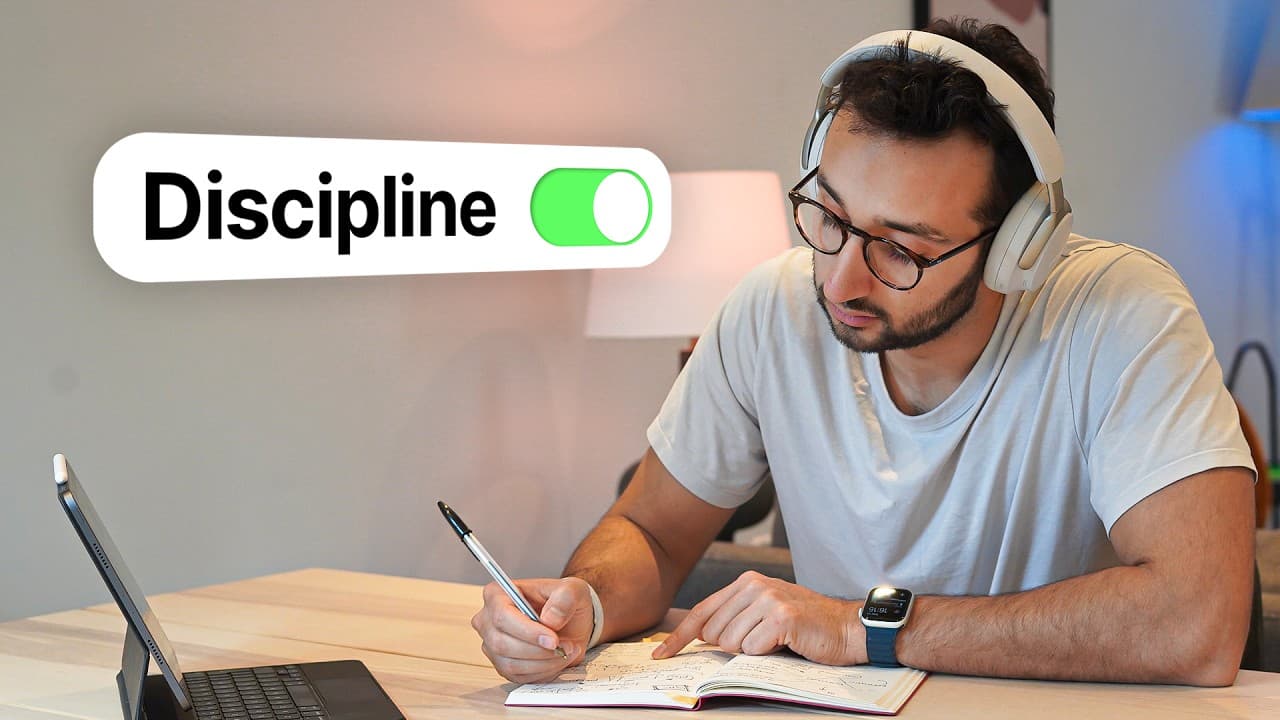5 Actionable Ways to Become More Self-Disciplined
12 Apr 2024 (over 1 year ago)

A note on discipline (0s)
- Discipline involves making work enjoyable rather than forcing oneself to do unpleasant tasks.
- The aim is to make work feel effortless and enjoyable, like a downhill journey.
- Overcoming the initial resistance is crucial, and discipline is essential during this phase.
- Ryan Holiday exemplifies self-discipline through his apparent enjoyment of his work and life.
- To achieve self-discipline, set clear and specific goals, break them into smaller steps, create a plan, eliminate distractions, and practice self-compassion and forgiveness.
1. The Main Thing (3m36s)
- To improve self-discipline, focus on a few important tasks rather than attempting too many things simultaneously.
- Prioritize tasks and eliminate non-essential activities.
- Consider seeking therapy to enhance emotional well-being and mental health, which can contribute to better self-discipline.
- Limit goal setting to three or four per year to avoid feeling overwhelmed and inconsistent.
- Ask yourself what you would do if you had limited time each week and prioritize those tasks.
- Avoid taking on too many commitments, as this can lead to feeling overwhelmed and less likely to be self-disciplined.
2. Progress Not Immediate Success (8m56s)
- Progress is more important than immediate success when adopting a new habit or mindset.
- Lowering the bar for action can help overcome perfectionism and increase consistency.
- The Fog Behavior Model (B=MAP) suggests that motivation, ability, and a prompt are necessary for behavior to occur.
- Start with small, easy actions and gradually increase the difficulty over time.
- Develop a generalized skill of self-discipline that can be applied to various aspects of life.
- Trust the process by repeating the same action multiple times and gaining a sense of its rhythm.
- Enjoy the process by recognizing and overcoming challenges along the way.
3. The Lower Self & Higher Self (14m15s)
- The concept of a "higher self" and a "lower self" explains the tension between long-term goals and immediate gratification.
- Internal Family Systems (IFS) therapy recognizes that we have multiple different "characters" within our brains, each with its own needs and perspectives.
- IFS therapy aims to get these different characters to communicate with each other and find a middle ground, rather than suppressing or ignoring certain aspects of ourselves.
- Acknowledging and accepting the concerns of different parts of ourselves can help us find compromises and make decisions that align with our long-term goals.
4. Flexible Routine (18m29s)
- Lack of structure and routine can lead to inconsistency and decreased self-discipline.
- Creating a flexible routine around desired activities can improve self-discipline and prevent burnout.
- Focus on general principles rather than specific routines for flexibility and structure.
- Set a minimum viable session goal to maintain consistency.
- Use the ABC goal system (A goal: Ideal scenario, B goal: Alternative vigorous exercise, C goal: Minimum activity) to ensure progress even with limited time or resources.
5. Stick Don't Switch (24m26s)
- Pick one thing and stick with it through ups and downs.
- Sticking to a method improves self-discipline and consistency.
- Ryan Holiday's prolific writing is due to his consistent use of the same note card system for 20 years.
- Constantly changing productivity apps or systems increases cognitive burden and reduces productivity.
- Reducing cognitive friction by sticking to one system lowers the initial hump of starting a task.
- The secret to success is picking something and not quitting.
- People who stick to one system produce more output and are more disciplined and impactful than those who frequently switch.
- Seneca's concept of "emia" refers to tranquility and staying focused on one's path without distractions.